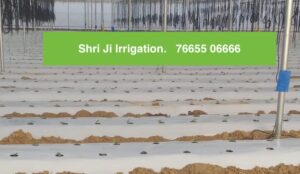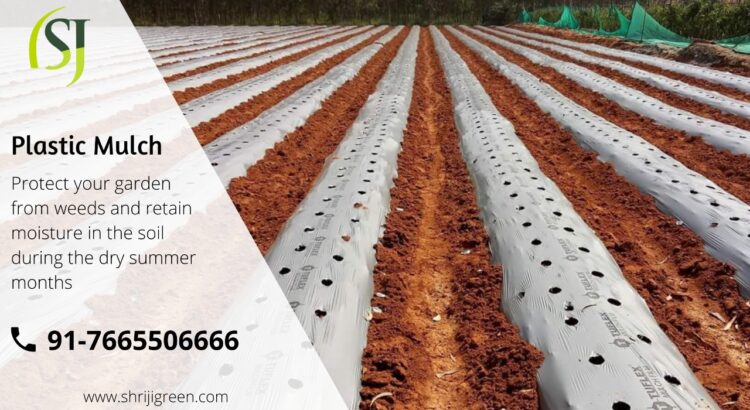Plastic mulch has been around since the 1980s, and in recent years it’s become an increasingly popular alternative to organic mulch like bark or straw. That’s because using agriculture plastic mulch has several benefits over using organic mulch, such as keeping weeds away, protecting young plants from cold weather, and preventing moisture loss from the soil.
However, there are also drawbacks to using mulch sheet that you should be aware of before purchasing this material for your garden. Read on to learn about the pros and cons of using mulching film in your garden.
Plastic mulch, also known as agriculture plastic film, can be used to protect your garden from weeds and retain moisture in the soil during the dry summer months. In order to decide whether or not mulching film would be beneficial for your garden, you’ll want to take a look at the pros and cons of using mulching so that you can decide whether or not it’s worth the hassle. In this article, we will explore the pros and cons of using agriculture mulch in your garden in more detail.
Whether you’re planting a new flower bed or preparing your yard for the summer, there are quite a few reasons why you may choose to use plastic mulch in your landscaping project. But what are the pros and cons of using plastic mulching? Let’s take a look at some of the most important benefits and drawbacks of this particular gardening technique to help you make the decision that’s right for your garden.
Are you planning to buy plastic mulching? Check it out here!

The pros of using plastic mulch
plastic mulch is more affordable than organic mulching. It helps retain soil moisture and holds in heat (which can increase yields). Unlike straw or hay, it’s impermeable to oxygen, which helps prevent weed growth. It’s also easy to lay on fields since it only takes an hour or two to cover a 40-acre field. Also, plastic mulch lasts for up to 10 years, while other types of mulches last no longer than 3-5 years.
For a gardener, plastic mulch provides many benefits. Perhaps most importantly, it helps to control weeds, which is essential for ensuring your plants have adequate access to soil nutrients. It also holds in moisture—particularly helpful if you live in an area with dry or arid conditions.
Plastic mulch will protect your garden from erosion and can suppress disease-causing organisms like mould. It’s also easy to use; simply lay down sheets of plastic over your beds in preparation for planting, trimming as necessary based on how much space you need between plants. Plus, they last for years so there’s no need to replace them each season—just check out what condition they’re in at spring planting time before deciding whether or not it’s time to replace them entirely.
- You’ll conserve water by preventing moisture loss from evaporation. The plants will grow healthier and you’ll harvest a better crop overall. And while plastic mulch is expensive, it saves you money on seed costs (which is more important if you’re growing for food instead of as an ornamental). Learn more about choosing between black, white, or clear plastic mulches.
The cons of using plastic mulch
When using plastic mulch or say it Agriculture Mulch, make sure that you’re purchasing from a reputable company to ensure that your mulch is safe for use in your garden. You also need to dispose of mulch properly so that it doesn’t end up littering our landfills. Before purchasing plastic mulch or using it in your garden, make sure to research its benefits and side effects carefully. With proper research, you can avoid using plastic mulching if you prefer another type.
Plastic mulch is an unnatural product. It is not compostable, although it can be recycled. The real problem lies in disposing of plastic mulch; you can’t just throw it in a compost pile or bury it because if it breaks down, it may create gases that harm plants. There have been documented cases where recycling centres have refused to accept plastic mulch.
And no matter what kind of mulch you choose, read up on how to care for it properly. This will help keep your plants healthy! In conclusion, mulch is great for most people; however, before deciding on whether or not to use plastic as your favourite planting medium, consider all pros and cons first.

Other considerations when using plastic mulch
Some of its pros include reducing weed growth, protecting plants from wind damage, and preventing soil erosion. Some cons include becoming brittle during hot temperatures (which means it can become damaged more easily), as well as being a non-renewable resource. Also, because it isn’t biodegradable, you need to be careful about where you dispose of plastic mulch in case it ends up in our oceans or waterways.
At some point, it may break down into microplastics that will travel through nature. A recent study found that 97% of all seabirds have ingested plastic; if we want to keep our water clean and marine life healthy, we should consider alternatives like organic mulches such as cocoa bean shells or coconut husks.
The price for using mulch sheet is a little higher upfront than other mulching materials. However, as plastic mulching is reusable year after year, it will ultimately save you money in labour costs. The amount of labour required to lay down a new sheet or rolls is not much different from laying down traditional mulches.
Another aspect to consider when deciding between plastic and organic mulches is safety; while organic mulches do decompose over time, they can still contain pathogens that may pose a threat to humans if ingested. With its smooth texture and non-absorbent surface, however, plastic doesn’t hold these same dangers.
Conclusion-
Plastic mulching has its own advantages and downsides. However long you realize how to utilize (and discard) plastic mulching appropriately, you can boost its advantages without thinking about the disadvantages!
Share your thoughts in the comments below!





